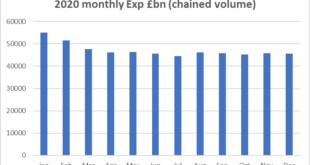In 2020, GDP per head of population fell, year on year, by a massive 10.5%. For me, that’s the take-away statistic from last Friday’s GDP-related ‘data dump’ by ONS. The level of GCDP per head (in real, inflation-adjusted terms) was £29,124. This was almost identical to the level in 2009 (£29,098), at the peak of the global financial crisis, and otherwise the lowest on record since 2003. Of course, the extent of the decline is heavily down to the government’s first lockdown restrictions,...
Read More »GDP, Brexit & the trade winds of change
In 2020, GDP per head of population fell, year on year, by a massive 10.5%. For me, that’s the take-away statistic from last Friday’s GDP-related ‘data dump’ by ONS. The level of GCDP per head (in real, inflation-adjusted terms) was £29,124. This was almost identical to the level in 2009 (£29,098), at the peak of the global financial crisis, and otherwise the lowest on record since 2003. Of course, the extent of the decline is heavily down to the government’s first lockdown restrictions,...
Read More »Review: Trade Wars are Class Wars
The following review appeared in the Times Literary Supplement on 6th January, 2021. Trade Wars are Class Wars presents an eagle-eyed perspective on the global economy, underpinned by close analysis and a remarkable clarity of exposition. The book is a terrific survey of the forces behind today’s global trade tensions and imbalances – even if the authors ultimately fall short of defining an alternative system. Matthew C. Klein and Michael Pettis contend that trade wars – such as currently...
Read More »Review: Trade Wars are Class Wars
The following review appeared in the Times Literary Supplement on 6th January, 2021. Trade Wars are Class Wars presents an eagle-eyed perspective on the global economy, underpinned by close analysis and a remarkable clarity of exposition. The book is a terrific survey of the forces behind today’s global trade tensions and imbalances – even if the authors ultimately fall short of defining an alternative system.Matthew C. Klein and Michael Pettis contend that trade wars – such as currently...
Read More »Review: Trade Wars are Class Wars
The following review appeared in the Times Literary Supplement on 6th January, 2021. Trade Wars are Class Wars presents an eagle-eyed perspective on the global economy, underpinned by close analysis and a remarkable clarity of exposition. The book is a terrific survey of the forces behind today’s global trade tensions and imbalances – even if the authors ultimately fall short of defining an alternative system.Matthew C. Klein and Michael Pettis contend that trade wars – such as currently...
Read More »The Minor Mystery of the Euro’s Trade Effect
The predilection for More Trade I do not consider an increase in inter-country trade a good thing in and of itself, though that view is common among economists and in the media. For most economists increased trade reflects a putative more efficient international allocation of resources derivative from competition on a global...
Read More »Of vaulting ambition, Macbeth, and what GATT Article 24 actually says
Macbeth:I have no spurTo prick the sides of my intent, but onlyVaulting ambition, which o'erleaps itself,And falls on th'other. . . .Boris Johnson is a moral (or is it amoral?) coward, dispenser of racist remarks, teller of untruths, and general political fantasist. Driven by ambition and lust for power, he appears to have no...
Read More »The slowing economy of the Single Market and NAFTA era
Ten years on from the full explosion of the Great Financial Crisis in autumn 2008, and Brexit lurking just round the corner… A lot of the Brexit arguments revolve around the perceived pros and cons of the EU’s Single Market; meanwhile, President Trump has been using force majeure to overturn aspects of the 1994 NAFTA deal. Given this conjuncture, I thought it would be instructive to take stock and assess, over a longer time-frame, how the UK and other developed economies have...
Read More »Does the EU “single market” foster trade?
Much of the debate over Brexit focuses on narrowly on trade in goods. In that debate one finds relatively little discussion of the performance of the EU internal market with regard to commodity trade (“goods”). The typical argument for the British government negotiating a post-Brexit agreement presumes that EU internal market...
Read More »UK Budget 2017 & OBR forecast: PRIME & Treasury Select Committee
On Wednesday 29 November 2017, PRIME's director, Ann Pettifor, gave evidence at the Committee's invitation to the UK Parliament's Treasury Select Committee, together with Professor Jagjit Chadha, Director, National Institute of Economic and Social Research and Paul Johnson, Director, Institute for Fiscal Studies. A verbatim report of the discussion can be found on the Select Committee's website here. Below we publish PRIME's written evidence to the Treasury Select Committee....
Read More » Heterodox
Heterodox





